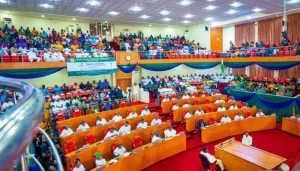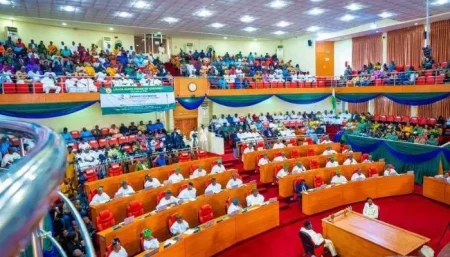The demolition of 15 workshops at the Otumara Mechanic Village in Lagos, Nigeria, has ignited a heated conflict between the state government’s urban development ambitions and the rights of informal sector workers. The Amalgamated Union of Motor Mechanics and Technicians of Nigeria (AUOMMATON), backed by the Nigeria Labour Congress (NLC), accuses the government of orchestrating an unlawful land grab disguised as urban renewal, leaving over 100 workers and their families without livelihoods. Established in 1980 under Governor Lateef Jakande, the mechanic village, with workshops formally allocated through the Ministry of Transportation in 1989, served as a vital hub for affordable automotive repair services, contributing significantly to Lagos’s transportation sector. The union contends that the demolition not only disregards their legal occupancy, evidenced by valid land allocation documents, but also undermines the state’s own policy of designating specific areas for mechanics and other artisans.
The demolition, carried out on March 7, 2025, followed a series of contradictory actions by various state agencies. Initially, the Lagos State Building Control Agency issued contravention notices, which were seemingly withdrawn after the union presented its land documents. Subsequently, the Ministry of Physical Planning and Urban Development served a two-day eviction notice, only to reportedly retract it after further engagement with the union. Despite assurances from the Ministry that the workshops would remain untouched, bulldozers, accompanied by security personnel and alleged “hoodlums,” razed the facilities, forcing union members off the site at gunpoint. This sequence of events, according to the union, points to a deliberate and calculated effort to dispossess them of their legally acquired property.
AUOMMATON vehemently denies any wrongdoing, emphasizing their four decades of lawful operation, payment of ground rent, and substantial contribution to the state’s economy. They view the demolition as a direct attack on their livelihoods and a blatant disregard for their rights as legitimate business operators. The union leadership, including Lagos State Chairman Julius Lawa and State Secretary Abdul Yusuf, alleges that private interests are manipulating government machinery to seize valuable land, leaving hardworking citizens without means of survival. They maintain that the demolition was not a mistake but a carefully orchestrated scheme designed to benefit powerful individuals at the expense of the vulnerable informal sector.
The NLC, representing a powerful labor force in Nigeria, has thrown its weight behind AUOMMATON, warning of potential broader labor action if the government fails to address the issue. Agnes Funmi, Chairman of the NLC’s Lagos State chapter, accused state officials of intercepting or downplaying the union’s appeals to Governor Babajide Sanwo-Olu. She urged the government to acknowledge the mechanics’ vital economic contributions and the potential disruption their absence could cause to Lagos’s transportation system. Funmi emphasized the need for dialogue and a just resolution, including either relocation or permission to continue operations at the existing site, to avoid escalating the situation into widespread protests and disruptive actions.
Legal representation for AUOMMATON has been taken up by Jiti Ogunye of Jiti Ogunye Chambers, who condemns the demolition as a violation of established state policy. Ogunye points to the Jakande administration’s initiative to organize roadside mechanics into designated villages, with oversight from the Ministries of Transportation and Physical Planning. He argues that the current government’s actions undermine this policy, jeopardizing the livelihoods of artisans who were granted land in these designated areas. Ogunye highlights that the Land Use Act, while allowing for land acquisition for public purposes, also encompasses supporting the livelihoods of artisans, a crucial aspect of public welfare. He warns of legal action if the government fails to relocate the affected artisans or provide adequate compensation.
The demolition incident has brought to the fore the complex challenges of urban development in Lagos, where rapid urbanization often clashes with the rights of informal sector workers. The mechanic village, providing affordable automotive services crucial to the city’s transportation network, represents a vital component of the informal economy. Its destruction could lead to increased repair costs, negatively impacting drivers and small businesses reliant on these services. The situation also raises concerns about potential social unrest, particularly given AUOMMATON’s affiliation with the NLC, which has a history of mobilizing against perceived injustices. The incident places the Sanwo-Olu administration in a delicate position, needing to balance investor confidence with the demands of a significant segment of the workforce. The government’s silence on the matter risks further alienating the informal sector, a critical backbone of Lagos’s economic activity. As Lagos continues its rapid growth towards megacity status, the Otumara case underscores the urgent need for clear policies that protect the rights and livelihoods of informal workers while pursuing urban development goals.














